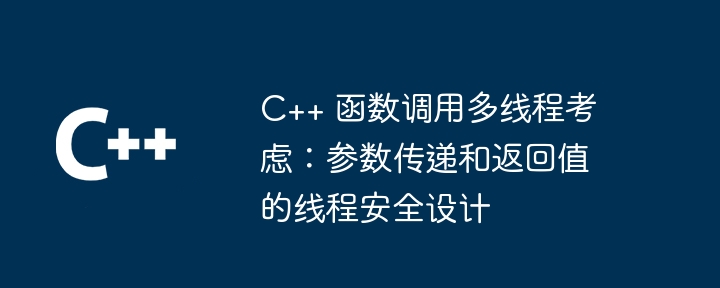Home >Backend Development >C++ >Multi-thread considerations for C++ function calls: Thread-safe design of parameter passing and return values
Multi-thread considerations for C++ function calls: Thread-safe design of parameter passing and return values
- WBOYWBOYWBOYWBOYWBOYWBOYWBOYWBOYWBOYWBOYWBOYWBOYWBOriginal
- 2024-05-01 22:36:021096browse
The thread-safe design of calling functions in a multi-threaded environment involves parameter passing and return values. Passing by value and smart pointer passing ensure thread safety. Reference passing and reference returning require thread synchronization to prevent race conditions. In addition, thread-local variables, mutexes, and condition variables are also important techniques for maintaining thread safety.

C Multi-thread considerations for function calls: Thread-safe design of parameter passing and return values
Calling functions in a multi-threaded environment When doing so, thread safety issues of parameter passing and return values need to be considered to ensure data consistency and avoid potential race conditions. The following are some key design principles and practical cases:
Parameter passing
- Value passing (passing by value):Parameter value Copy into the function to avoid modifying the original value. This is the simplest way to ensure thread safety.
- Pass by reference (passing address): Pass the reference of the parameter, allowing the function to modify the original value. This approach requires additional considerations for thread synchronization to prevent race conditions.
- Smart pointer passing: Use smart pointers to manage the ownership and life cycle of objects to avoid wild pointer and dangling pointer problems.
Practical case: value transfer
void incrementValue(int value) {
value++;
}
int main() {
int x = 5;
std::thread t1(incrementValue, x); // 传递值,线程独立操作
t1.join();
std::cout << "x = " << x << std::endl; // 输出 x = 5,未被修改
}Return value
- Value return: The function returns a copy of the value to avoid modifying the original value.
- Reference return: The function returns a parameter reference, allowing the program to modify the original value. This approach requires thread synchronization to be considered.
- Smart pointer return: Use smart pointers to return objects to ensure the life cycle and ownership management of the object.
Practical case: reference return
int& getReference() {
static int value = 5;
return value;
}
int main() {
int& x = getReference(); // 获取引用,线程共享值
std::thread t1([&x] {
x++; // 线程中修改引用指向的值
});
t1.join();
std::cout << "x = " << x << std::endl; // 输出 x = 6,值已被修改
}Other considerations
- Thread local variables (TLS): Use thread local variables to store thread private data to avoid data sharing and competition.
- Mutex (Mutex) and condition variable (Condition Variable): Use mutex and condition variables for thread synchronization when reference is passed or pointer is returned to avoid concurrent access and race conditions .
By following these design principles and using appropriate techniques, functions can be called safely in a multi-threaded environment, ensuring data integrity and correct execution of the application.
The above is the detailed content of Multi-thread considerations for C++ function calls: Thread-safe design of parameter passing and return values. For more information, please follow other related articles on the PHP Chinese website!

